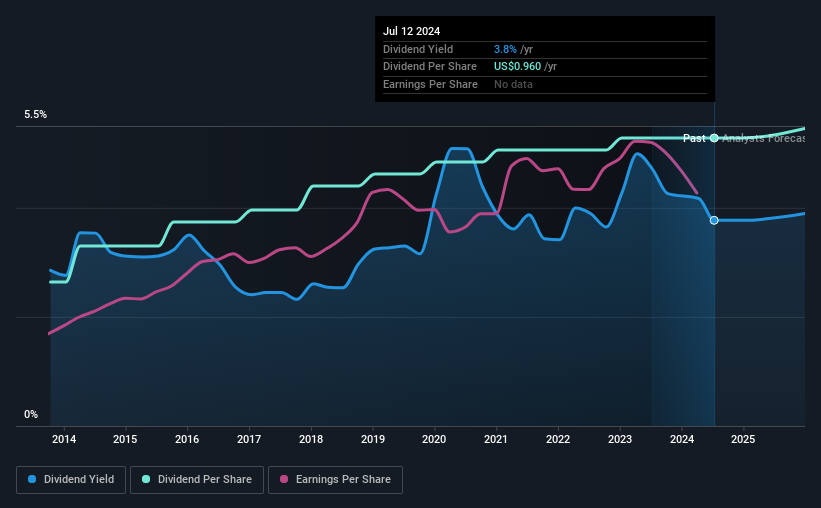First Busey Corporation's (NASDAQ:BUSE) investors are due to receive a payment of $0.24 per share on 26th of July. This means that the annual payment will be 3.8% of the current stock price, which is in line with the average for the industry.
View our latest analysis for First Busey
First Busey's Dividend Forecasted To Be Well Covered By Earnings
We aren't too impressed by dividend yields unless they can be sustained over time.
Having distributed dividends for at least 10 years, First Busey has a long history of paying out a part of its earnings to shareholders. Taking data from its last earnings report, calculating for the company's payout ratio shows 48%, which means that First Busey would be able to pay its last dividend without pressure on the balance sheet.
Over the next year, EPS is forecast to expand by 8.3%. If the dividend continues along recent trends, we estimate the future payout ratio will be 48%, which is in the range that makes us comfortable with the sustainability of the dividend.

First Busey Has A Solid Track Record
The company has an extended history of paying stable dividends. The annual payment during the last 10 years was $0.48 in 2014, and the most recent fiscal year payment was $0.96. This means that it has been growing its distributions at 7.2% per annum over that time. The dividend has been growing very nicely for a number of years, and has given its shareholders some nice income in their portfolios.
First Busey May Find It Hard To Grow The Dividend
Investors who have held shares in the company for the past few years will be happy with the dividend income they have received. Let's not jump to conclusions as things might not be as good as they appear on the surface. First Busey hasn't seen much change in its earnings per share over the last five years.
Our Thoughts On First Busey's Dividend
Overall, we think First Busey is a solid choice as a dividend stock, even though the dividend wasn't raised this year. With shrinking earnings, the company may see some issues maintaining the dividend even though they look pretty sustainable for now. This looks like it could be a good dividend stock going forward, but we would note that the payout ratio has been at higher levels in the past so it could happen again.
Companies possessing a stable dividend policy will likely enjoy greater investor interest than those suffering from a more inconsistent approach. However, there are other things to consider for investors when analysing stock performance. For example, we've picked out 1 warning sign for First Busey that investors should know about before committing capital to this stock. Is First Busey not quite the opportunity you were looking for? Why not check out our selection of top dividend stocks.
New: AI Stock Screener & Alerts
Our new AI Stock Screener scans the market every day to uncover opportunities.
• Dividend Powerhouses (3%+ Yield)
• Undervalued Small Caps with Insider Buying
• High growth Tech and AI Companies
Or build your own from over 50 metrics.
Have feedback on this article? Concerned about the content? Get in touch with us directly. Alternatively, email editorial-team (at) simplywallst.com.
This article by Simply Wall St is general in nature. We provide commentary based on historical data and analyst forecasts only using an unbiased methodology and our articles are not intended to be financial advice. It does not constitute a recommendation to buy or sell any stock, and does not take account of your objectives, or your financial situation. We aim to bring you long-term focused analysis driven by fundamental data. Note that our analysis may not factor in the latest price-sensitive company announcements or qualitative material. Simply Wall St has no position in any stocks mentioned.
Have feedback on this article? Concerned about the content? Get in touch with us directly. Alternatively, email editorial-team@simplywallst.com
About NasdaqGS:BUSE
First Busey
Operates as the bank holding company for Busey Bank that engages in the provision of retail and commercial banking products and services to individual, corporate, institutional, and governmental customers in the United States.
Flawless balance sheet with high growth potential and pays a dividend.
Similar Companies
Market Insights
Community Narratives




